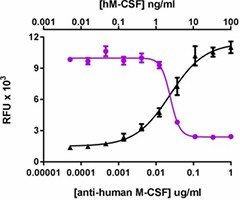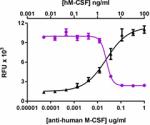- Clone
- A16067H (See other available formats)
- Regulatory Status
- RUO
- Other Names
- Macrophage Colony-Stimulating Factor 1, MCSF, CSF-1, Macrophage Colony Stimulating Factor 1, Colony Stimulating Factor 1 (Macrophage)
- Isotype
- Mouse IgG2b, κ

-

Recombinant human M-CSF induces the proliferation of mouse myelogenous leukemia lymphoblast M-NFS-60 cells in a dose dependent manner (black triangles). Anti-human M-CSF monoclonal antibody (clone A15139F, purple circles) neutralizes the proliferation of M-NFS-60 cells induced by recombinant human M-CSF (10 ng/ml). The ND50 = 0.01 – 0.05 µg/ml.
| Cat # | Size | Price | Quantity Check Availability | ||
|---|---|---|---|---|---|
| 699203 | 100 µg | $270.00 | |||
| 699204 | 1 mg | $715.00 | |||
Select size of product is eligible for a 40% discount! Promotion valid until December 31, 2024. Exclusions apply. To view full promotion terms and conditions or to contact your local BioLegend representative to receive a quote, visit our webpage.
M-CSF was first characterized as a glycoprotein that induces monocyte and macrophage colony formation from precursors in murine bone marrow cultures. M-CSF is constitutively present at biologically active concentrations in human serum. It binds CD14+ monocytes and promotes the survival/proliferation of human peripheral blood monocytes. In addition, M-CSF enhances inducible monocyte functions including phagocytic activity, microbial killing, cytotoxicity for tumor cells as well as synthesis of inflammatory cytokines such as IL-1, TNFα, and INFγ in monocytes. M-CSF induces RANKL production in mature human osteoclasts; consequently, M-CSF is a potent stimulator of mature osteoclast resorbing activity. Also, M-CSF induces VEGF in human monocytes in human tumors; high levels of M-CSF, mononuclear phagocytes, and VEGF are associated with poor prognosis in patients with cancer. High levels of M-CSF have been associated with different pathologies such as pulmonary fibrosis and atherosclerosis. M-CSF binds to its receptor M-CSFR, and this receptor is shared by a second ligand, IL-34. Human M-CSF and IL-34 exhibit cross-species specificity, both bind to human and mouse M-CSF receptors.
Product Details
- Verified Reactivity
- Human
- Antibody Type
- Monoclonal
- Host Species
- Mouse
- Immunogen
- Recombinant human M-CSF
- Formulation
- 0.2 µm filtered in phosphate-buffered solution, pH 7.2, containing no preservative.
- Preparation
- The Ultra-LEAF™ (Low Endotoxin, Azide-Free) antibody was purified by affinity chromatography.
- Concentration
- The antibody is bottled at the concentration indicated on the vial, typically between 2 mg/mL and 3 mg/mL. Older lots may have also been bottled at 1 mg/mL. To obtain lot-specific concentration and expiration, please enter the lot number in our Certificate of Analysis online tool.
- Storage & Handling
- The antibody solution should be stored undiluted between 2°C and 8°C. This Ultra-LEAF™ solution contains no preservative; handle under aseptic conditions.
- Application
-
Neut - Quality tested
- Recommended Usage
-
Each lot of this antibody is quality control tested by neutralizing activity. The ND50 is 0.01 - 0.05 µg/mL. It is recommended that the reagent be titrated for optimal performance for each application.
- Product Citations
-
- RRID
-
AB_2715880 (BioLegend Cat. No. 699203)
AB_2715880 (BioLegend Cat. No. 699204)
Antigen Details
- Structure
- Disulfide-linked glycosylated homodimer
- Distribution
-
M-CSF is released by fibroblasts, breast cancer cell lines, alveolar macrophages, stromal bone marrow cells, endothelial cells, and mesenchimal cells.
- Function
- Key regulator of the survival, proliferation, and differentiation of mononuclear phagocytes and plays a central role in the regulation of osteoclastogenesis. Regulates the development of Paneth cells, Langerhans cells, lamina propria dendritic cells, and microglia.
- Interaction
- Monocytes, macrophages, mononuclear phagocyte precursors, microglia, proliferating smooth muscle cells, umbilical vein endothelial cells, and breast cancer cell lines.
- Ligand/Receptor
- M-CSFR or CSF1R (CD115)
- Biology Area
- Cell Biology, Cell Proliferation and Viability, Immunology
- Molecular Family
- Cytokines/Chemokines, Growth Factors
- Antigen References
-
1. Kawasaki ES, et al. 1985. Science 230:291.
2. Wei S, et al. 2010. J. Leuko. Biol. 88:495.
3. Hodge JM, et al. 2011. PloS One 6:e21462.
4. Morandi A, et al. 2011. PloS One 6:e27450.
5. Erblich B, et al. 2011. PloS One 6:e26317.
6. MacDonald KP, et al. 2010. Blood 116:3955. - Gene ID
- 1435 View all products for this Gene ID
- UniProt
- View information about M-CSF on UniProt.org
Other Formats
View All M-CSF Reagents Request Custom Conjugation| Description | Clone | Applications |
|---|---|---|
| Ultra-LEAF™ Purified anti-human M-CSF | A16067H | Neut |
Compare Data Across All Formats
This data display is provided for general comparisons between formats.
Your actual data may vary due to variations in samples, target cells, instruments and their settings, staining conditions, and other factors.
If you need assistance with selecting the best format contact our expert technical support team.
-
Ultra-LEAF™ Purified anti-human M-CSF

Recombinant human M-CSF induces the proliferation of mouse m...
